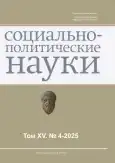Национально-государственная идентичность в цифровую эпоху: между патриотическим консенсусом и информационной тревогой
- Авторы: Гребняк О.В.1
-
Учреждения:
- Институт социально-политических исследований Федерального научно-исследовательского социологического центра Российской академии наук (ИСПИ ФНИСЦ РАН)
- Выпуск: Том 15, № 4 (2025)
- Страницы: 34-45
- Раздел: II Дробижевские чтения – 2025
- URL: https://journals.eco-vector.com/2223-0092/article/view/693217
- DOI: https://doi.org/10.33693/2223-0092-2025-15-4-34-45
- EDN: https://elibrary.ru/VWUAXC
- ID: 693217
Цитировать
Полный текст
Аннотация
Цифровая трансформация ставит под вопрос традиционные механизмы формирования национально-государственной идентичности. Если ранее ее воспроизводство было сосредоточено в руках государства и институтов (образования, культуры, традиционных СМИ и прочих), то сегодня ключевыми агентами влияния становятся цифровые платформы, алгоритмы и сетевые сообщества. Это порождает фундаментальные вызовы: фрагментацию информационного поля, рост недоверия к источникам информации, трансформацию гражданского участия и внутреннюю напряженность. В статье анализируются теоретические основания этих изменений: децентрализация власти в сетевом обществе, формирование информационных пузырей и эхо-камер, двойственная роль платформ как пространств одновременно общественной консолидации и поляризации, а также феномен сосуществования патриотического консенсуса и критического отношения к власти. Эмпирическая база – данные всероссийского социологического мониторинга «Как живешь, Россия?» – позволяет проследить, как эти процессы проявляются в реальном общественном сознании. Показано, что доверие к телевидению коррелирует с оптимизмом в отношении будущего страны, тогда как интернет-среда усиливает амбивалентность. Гражданское участие переходит в цифровой формат, особенно среди молодежи. При этом высокий уровень патриотизма сочетается с критикой власти, что свидетельствует о дифференциации гражданского сознания, а не его распаде. Можно заключить, что национально-государственная идентичность в цифровую эпоху не исчезает, но становится напряженным равновесием между доверием и тревогой, лояльностью и критикой, консолидацией и фрагментацией. Это требует от политики идентичности отказа от монополии на нарратив и перехода к его ко-производству с обществом.
Полный текст
Об авторах
Оксана Валерьевна Гребняк
Институт социально-политических исследований Федерального научно-исследовательского социологического центра Российской академии наук (ИСПИ ФНИСЦ РАН)
Автор, ответственный за переписку.
Email: oksananov@yandex.ru
ORCID iD: 0000-0002-4565-7095
SPIN-код: 6256-1918
научный сотрудник
Россия, г. МоскваСписок литературы
- Ахременко А.С., Стукал Д.К., Петров А.П. Сеть или текст? Факторы распространения протеста в социальных медиа: теория и анализ данных // Полис. Политические исследования. 2020. № 2. С. 73–91. doi: 10.17976/jpps/2020.02.06. EDN: APZWMB.
- Бауман З. Индивидуализированное общество. М.: Логос, 2005. 390 с.
- Бронников И.А. Самоорганизация граждан в эпоху цифровых коммуникаций // Контуры глобальных трансформаций: политика, экономика, право. 2020. Т. 13. № 2. С. 269–285. doi: 10.23932/2542-0240-2020-13-2-14. EDN: AJZOYZ.
- Володенков С.В. Интернет-технологии как современный инструмент виртуализации массовой политической реальности // Вестник Московского университета. Серия 12: Политические науки. 2017. № 2. С. 15–23. EDN: ZRKNOF.
- Воробьева И.Н., Мехова А.А. Проявление национальной идентичности в социально-политических ценностях студенческой молодежи // Наука. Культура. Общество. 2024. Т. 30. № 3. С. 114–129. doi: 10.19181/nko.2024.30.3.7. EDN: IHYSZN.
- Грачев М.Н., Евстифеев Р.В. Концепт «разрушения правды» в условиях цифрового общества (аналитический обзор) // Контуры глобальных трансформаций: политика, экономика, право. 2020. Т. 13. № 2. С. 229–248. doi: 10.23932/2542-0240-2020-13-2-12. EDN: CKTGBY.
- Добринская Д.Е. Что такое цифровое общество? // Социология науки и технологий. 2021. Т. 12. № 2. С. 112–129. doi: 10.24412/2079-0910-2021-2-112-129. EDN: ZLKPXS.
- Дробижева Л.М. Процессы гражданской интеграции в полиэтническом российском обществе (Тенденции и проблемы) // Общественные науки и современность. 2008. № 2. С. 68–77. EDN: IPVDHF.
- Кастельс М. Власть коммуникации. М.: ГУ ВШЭ, 2016. 563 с.
- Кастельс М. Информационная эпоха: экономика, общество и культура. М.: ГУ ВШЭ, 2000. 606 с.
- Левашов В.К., Великая Н.М., Шушпанова И.С. и др. Как живешь, Россия? Экспресс-информация. 55 этап социологического мониторинга, май 2025 г. М.: ФНИСЦ РАН, 2025 (в печати).
- Левашов В.К., Гребняк О.В. Экспансия искусственного интеллекта: ожидания и настроения граждан // Социологические исследования. 2024. № 12. С. 13–23. doi: 10.31857/S0132162524120022. EDN: XMNDBL.
- Паризер Э. За стеной фильтров. Что Интернет скрывает от вас? М.: Альпина Бизнес Букс, 2012. 304 с.
- Тишков В.А. Нация и национальная идентичность в России // Вестник Российской нации. 2008. № 1 (1). С. 120–128. EDN: KNVNCZ.
- Alter P. Nationalism. London: Hodder Education Publ., 1994. 160 p.
- Barberá P. Social media, echo chambers, and political polarization // Social media and democracy: The state of the field, prospects for reform. N.Y.: Cambridge University Press, 2020. Pp. 34–55. doi: 10.1017/9781108890960.004.
- Bennett W.L., Segerberg A. The logic of connective action: Digital media and the personalization of contentious politics. Cambridge: Cambridge University Press, 2013. doi: 10.1017/CBO9781139198752.
- Chadwick A. The hybrid media system: Politics and power. N.Y.: Oxford University Press, 2017. 368 p. doi: 10.1093/oso/9780190696726.001.0001.
- Earl J., Kimport K. Digitally enabled social change: Activism in the Internet age. Cambridge: MIT Press, 2011. 258 p.
- Gillespie T. Custodians of the Internet: Platforms, content moderation, and the hidden decisions that shape social media. New Haven: Yale University Press, 2018. 297 p. doi: 10.12987/9780300235029.
- Nielsen R., Graves L. “News You Don’t Believe”: Audience perspectives on fake news. Reuters Institute for the Study of Jounalism, 2017.
- Papacharissi Z. Affective publics: Sentiment, technology, and politics. N.Y.: Oxford University Press, 2014. 176 p. doi: 10.1093/acprof:oso/9780199999736.001.0001.
- Sunstein C.R. Republic.com 2.0. Princeton: Princeton University Press, 2007. 251 p. EDN: QWMTJV.
- Tajfel H., Turner J. The social identity theory of intergroup behavior // Political Psychology. J. Jost, J. Sidanius (eds.). N.Y.: Psychology Press, 2004. Pp. 276–293.
- Tufekci Z. Twitter and tear gas: The power and fragility of networked protest. New Haven: Yale University Press, 2017. 360 p.
- van Dijck J. The culture of connectivity: A critical history of social media. N.Y.: Oxford University Press, 2013. 228 p. doi: 10.1093/acprof:oso/9780199970773.001.0001.
- Wardle C., Derakhshan H. Information disorder: Toward an interdisciplinary framework for research and policy making: Report. Council of Europe, 2017.
Дополнительные файлы














